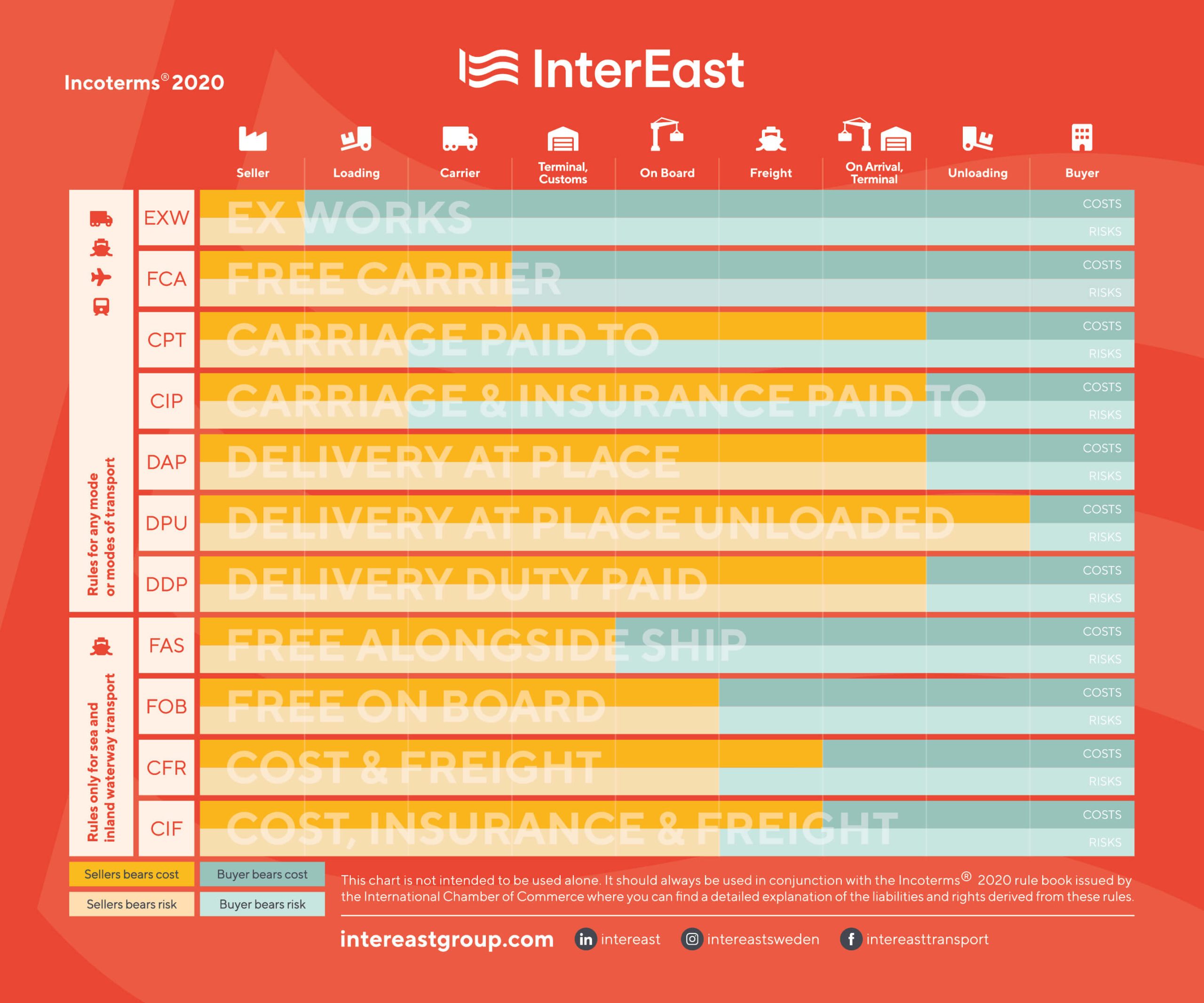
InterEast Incoterms 2020 mouse pad
InterEast 3rd of May 2023
Incoterms 2020: Delivery terms and rules to avoid misunderstandings in the transportation of goods
Incoterms 2020 are rules that establish who is responsible for costs and risks during the transportation of goods in international trade. Incoterms 2020 is the latest version of these delivery terms and is globally recognized by authorities and courts. As a freight forwarder and for you as a client, it is important to understand Incoterms and their benefits to minimize the risk of conflicts. This article explains what Incoterms are, how to use them, and our best tips for avoiding the most common mistakes made. You will be a pro in no time. Let´s get cracking.
What are Incoterms?
Incoterms are an abbreviation of “International Commercial Terms” and are used to standardize trade conditions in international trade. The rules clearly define the obligations and responsibilities of the buyer and seller during the transportation of goods.

Why are Incoterms delivery terms important?
Using delivery terms is important to avoid misunderstandings and conflicts between buyers and sellers in international trade. Clearly establishing who is responsible for costs and risks during transportation reduces the risk of disputes and legal battles.
What do the different abbreviations in Incoterms 2020 mean?
- EXW (Ex Works): The seller delivers the goods to their premises, and the buyer is responsible for transportation and costs.
- FCA (Free Carrier): The seller delivers the goods to a carrier chosen by the buyer at a specified place.
- CPT (Carriage Paid To): The seller is responsible for transportation costs to a specified destination.
- CIP (Carriage and Insurance Paid to): Like CPT but the seller is also responsible for insurance during transportation.
- DAP (Delivered At Place): The seller delivers the goods to a specified place, but the buyer is responsible for import duties and taxes.
- DPU (Delivered at Place Unloaded): Like DAP but the seller is responsible for unloading the goods at the destination.
- DDP (Delivered Duty Paid): The seller is responsible for transportation, customs, and taxes to a specified destination.
- FAS (Free Alongside Ship): The seller is responsible for the goods until they are loaded onto the ship at the port of departure.
- FOB (Free on Board): The seller is responsible for the goods until they are loaded onto the ship at the port of departure, but the buyer is responsible for transportation costs.
- CFR (Cost and Freight): The seller is responsible for transportation costs to a specified destination and for loading the goods onto the ship.
- CIF (Cost, Insurance and Freight): Like CFR, the seller is also responsible for insurance during transportation.
What is the difference between Incoterms 2020 and the previous version?
Incoterms 2020 replaces the previous version, Incoterms 2010. The new rules contain several updates and clarifications, including new rules for “Free Carrier” (FCA) and “Free Alongside Ship” (FAS), as well as a clearer definition of the responsibility allocation for “Cost, Insurance and Freight” (CIF) and “Carriage and Insurance Paid To” (CIP).
Here, we have highlighted the major differences that affect insurance in transport.
The delivery clause DAT “Delivered at terminal” has been renamed to DPU “Delivered at place unloaded”.
In the delivery clause CIP, a higher requirement is now placed on the seller who must arrange for insurance. According to Incoterms 2020, the insurance must meet the condition of Institute Cargo Clauses (A). Previously, under Incoterms 2010, one was only obligated to meet the condition of Institute Cargo Clauses (C).
Recommended delivery clause to avoid conflicts.
To avoid discussions on responsibility allocation in case of any damage to the goods, it is recommended to use a delivery clause where one party assumes the risk throughout the transport. This reduces the risk of conflicts and simplifies the transport process for both the seller and the buyer.

Johan Talp, Team Leader Air & Sea at InterEast
Our best tips for succeeding using Incoterms 2020
As a freight forwarder, I understand the importance of following the correct Incoterms to ensure smooth international trade – and how complex it can be.
Here are my three best tips on how to use Incoterms:
- Know your Incoterms: Before you start trading internationally, make sure you have a good understanding of the Incoterms that are most used in your industry. Knowing the difference between EXW and DDP can save you a lot of headaches in the long run.
- Be clear and specific: When negotiating a deal with your buyer or seller, it’s important to be clear and specific about the chosen Incoterms. Don’t assume that everyone knows what you mean when you say “FOB”. Be clear about the responsibilities and risks that each party will assume.
- Get help when you need it: If you’re not sure which Incoterms to use, or if you’re having trouble negotiating the terms with your partner, don’t hesitate to reach out to a freight forwarder for help. We’re experts in this stuff and always happy to lend a hand.
Here are three of the most common mistakes people make when using Incoterms and how to avoid them:
- Assuming you know everything about Incoterms: It’s easy to assume that you understand an Incoterm just because you’ve heard of it before. However, each Incoterm has specific implications and nuances that can make a big difference in the success of your international trade. Don’t be afraid to do some research or ask for help from a freight forwarder to ensure you fully understand the chosen Incoterm.
- Forgetting to communicate clearly: Communication is key when it comes to using Incoterms. Failing to clearly communicate the chosen Incoterm and its associated responsibilities and risks with your buyer or seller can lead to confusion and disagreements down the line. Make sure you’re crystal clear about what’s expected from each party.
- Ignoring updates and changes: Like any other regulation, Incoterms are updated periodically to reflect changes in international trade practices. Ignoring these updates can lead to using outdated Incoterms, which can result in serious financial consequences. Stay up to date on the latest Incoterms to avoid any confusion or misunderstandings.
Remember, using Incoterms doesn’t have to be complicated or stressful. With a little bit of knowledge and a lot of communication, you can navigate the world of international trade like a pro. And if you ever need a helping hand, just call your freight forwarder.
PS. If you want the Incoterms close by, you must get your hands on one of our handy, high-quality mousepads. Send me an email, and I’ll send one over right away (as long as supplies last).

